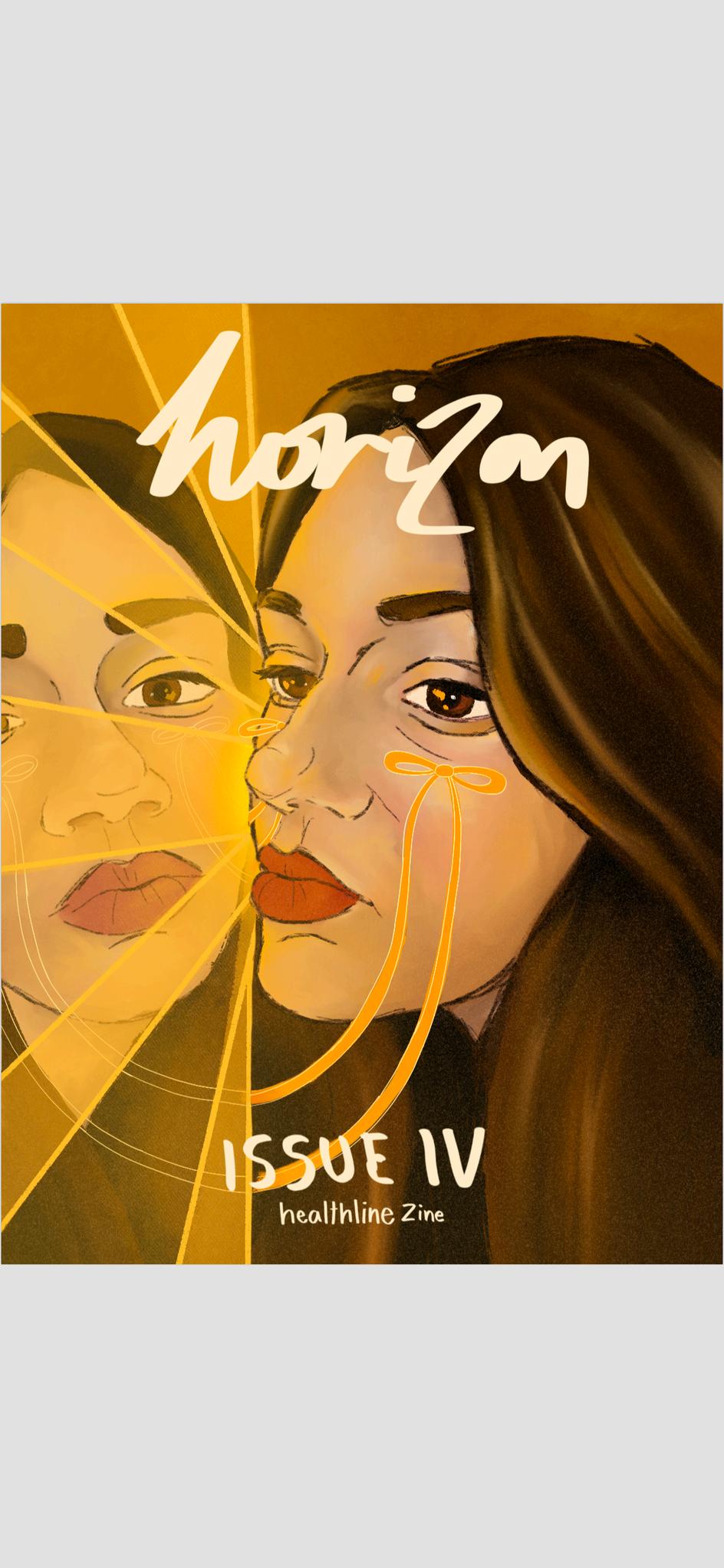

Table of Contents
Letter from the Editor
Issue Interpretation
after the rain
I. you have to see it
.Migration Patterns
Above the Edge
Where the Fox and the Hare say Goodnight
After the half marathon after you the silence of plumeria trees
ii. glimpses of known and unknowns known machinery of the body / underyoume
I’m worried that I’m not following / the instructions
that which only we know ARRIVED, SETTLED, DEPARTED, (LEAVES)
For These Brief Moments
I Walked 3,000 Miles To Susan Sontag’s Kingdom of the Ill and It Was Just The Back Of The Uber Where You Told Me
You Had Cancer Door
They told me the borderline was incapable of love / but A Saturday, Like Every Other Apocalypse
Grateful Scents
iv. lost and found, again, again (with beauty) i found it again
This is not a curse
Yapp
Kate Low
Leslie Cairns
Jassifat Kaur Khurana
A J M Aldrian
Amy Devine
Katie Stirling
Chisom Eze Arushi (Aera) Rege
Cailey Tin Qetsiah Joachim-Baggot
Tim Murphy Ari Watkins
Katie Stirling
Zoe Davis
Jessica Swanson
Angela Townsend
Charolette Poe
Afra Adil Ahmad
Letter From The Editor
Out of all the lovely issues that healthline has come up with, I think I’ve needed this one the most Halfway through the making of this issue which, I confess, has taken such a length of time largely because of moments like this I lay in bed, paralyzed by the greyness of depression, in pain from another flare-up, and vaguely pressured by the thought of all the work that remained, because the issue still wasn’t done I lay, and I wept, and I needed, so desperately, to know that there was the potential for something more beyond this That life was more than the worst points of my illnesses
That this story was more than a collection of blurry, emotionless shots taken in every flare up, tracking progression and digression; more than bitter crying at the absurdity of it all.
As I lay then, I knew this issue needed to exist. If for no one else, then for me. For the me of that moment, and the me of several weeks in the future, who would no doubt be in a similar spot again. Then for all others that have felt the very same, needing something to remind them of hope. Of some sort of healing. Some happy after.
For me, and for all others, because this is life To the community of healthline, this cycle of sickness and healing, of relapses and flare-ups and pain, pain, pain through it all, is so much of life
Yet as I hoped on that day as we all collectively hope, with the heart and beauty given generously in these pieces there must be more There must be something better, something we fail to see fully in those moments Something we forget in between living it
Something that is also life, and very worth remembering
It is true that much complicated pain exists: issue iii asked for the worst parts of living through illness and recovery. It spoke the unspeakable. The collective catharsis and honesty of the issue was needed. Equally true, or perhaps truer still, is the horizon that lies beyond that pain. And for all of us whose lives echo with illness, we wanted to remember it. Celebrate it. For a moment, even, to live it. Perhaps you ’ re not there yet, and have never seen it horizon. If so, let these works speak to you in a glimpse of the beauty that others’ horizons held. Finding open water to migrate over, as Leslie Cairns’ Migration Patterns puts it, or the sight of normalcy, or the Grateful Scents of a new-old tradition at thanksgiving.
Perhaps it’s all unknown, and you ’ re afraid to step into it, afraid to move then let the issue’s opener invite you in Bit by bit, after confessions
Perhaps you know of horizon’s existence, but just aren’t there right now Then, might we invite you to breathe in the peace of the place Where the Fox and the Hare say Goodnight? Or to bask in the triumph of “after you”? To live, for a moment, in the light of the horizons painted here?
Letter From The Editor
Perhaps you ’ re here, and you don’t want to leave, no matter how hard life fights to make you move on Well, stay awhile in this issue But once it is time,
let us remind you that This is not a curse And that the horizon will return, again, again, in different forms yet always at peace, always joyous somehow, always lovely
In this issue, we ’ ve found horizon in so many different forms Indeed, many horizons are only understood by those that know illness: with much pain, but much joy also.
Come up here to the lookout. Feel the sun ’ s first rays. Look at horizon through our lens. See what awaits.
It’s beautiful. All of us, only us, can know it.
With hope,
Janelle Yapp Publication DirectorIssue Interpretation
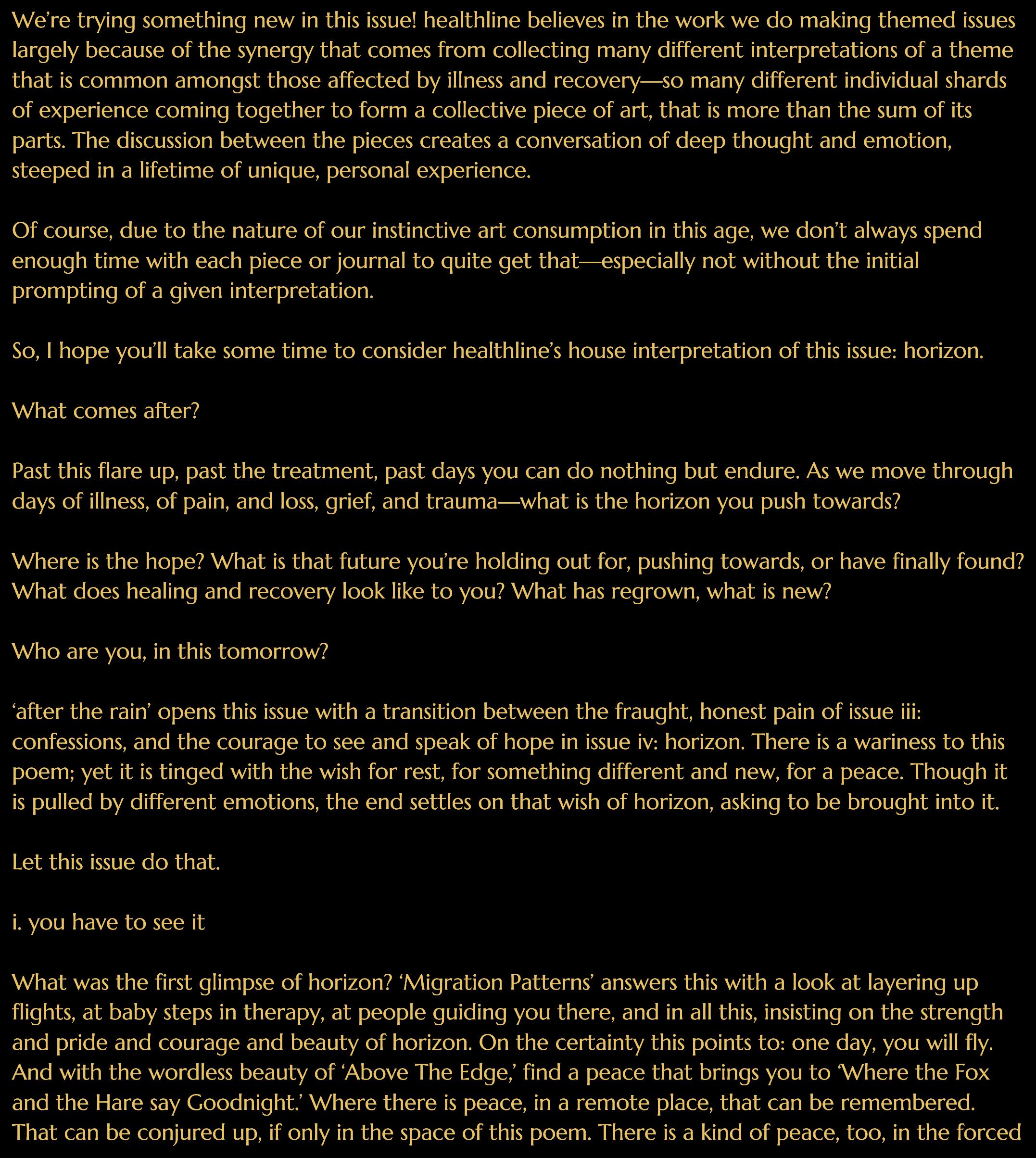
Issue Interpretation
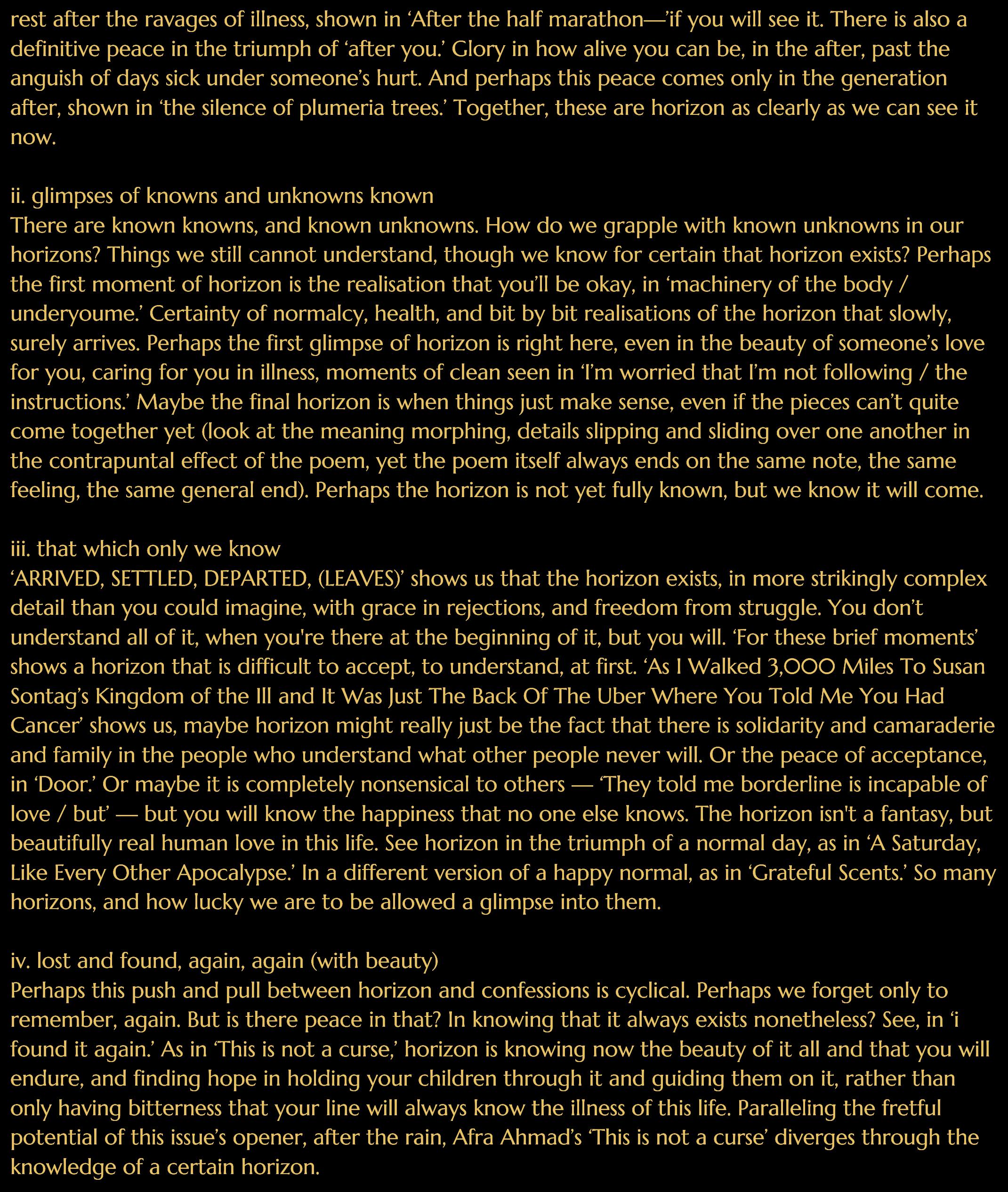
after the rain
By: Kate Lowkeep an eye on the horizon and the other on the door lock us in heavy wood bolted firm against the storm, and warn me when the sheathes start to slip; shadows start to shift we were only ever on the precipice of the aftermath; wondering what happens when the curtains open light floods in what happens when the knife is pulled out shh, i know, i know, breathe, br what happens when the tide rescinds
blanket me all you wish in the heft of hopelessness lose me in the allure of despair but warn me when the brakes start to screech; light emerges, the tunnel shortens away; when we reach the ending of never-ending pain
i know this was drowning but the water is so soft and warm and i don't want to leave, please, let me stay bring me where the clouds all go to hide after the rain?
you have to see it
Migration Patterns
By: Leslie CairnsCrying is normal in therapy, she says A goose – if injured– gets tended to by the larger flock I watched it happen once The limping goose at the tail end, seemingly forgotten, but they wouldn’t really fly until his limp leg reached where they were pecking the grass apart
“You moved about 1800 miles away from abuse,” My therapist says Eyes glistening “That’s a buffer, and you were strong for creating your own safety ”
Even though there’s boundaries, she tears up, and I get scared Thinking she’ll fly – the world will spin – without me I added nutritionist services to the mix (once a week, she said, to start) To think I was almost going to forgo them But what if – hear me out – now there is the Wellbutrinandthelexaproandthepillstosleepandthe15minutesofheavyweightliftingatnighttohelpyousl eeptooandthenacintheorangepillandthetwiceaweektherapyandthenutritionistguidestomealsandthef oodbankandyourfriendsandapsychiatristthatmakessureyourewellonwellbutrin–
Maybe if all those layers are pebbles – sentiment – into stone, you’ll find that I’m almost happy An hour more sleep A smile on the Zoom call, talking about carrots in ranch dressing, how I used to like it Maybe my therapist will stop hearing stories that are quite so sad, from me If she’ll take my foot and heal it with twine, but the twine are whisperings, like: she was wrong, you ’ re special, we’ll hold the flying for you, you’ll be alright
I tell her maybe I’m a fawn, with every kindness she gives me, I show her my hurt leg, flopped open. Dogs do it too, if they’re afraid: they flop on the ground, belly to the sun and snow, showing the other dogs their vulnerability, that they’re submissive, so they won’t get hurt.
She laughs You’re no fawn
You’re strong
A goose whose now gone? I say, smiling
She looks at me, eyebrows furrowing, not quite getting what I’ve said
Will I ever be able to nurse something back to life someday? I think of etchings I’ve almost said: iwanttobeamother, I’dbegoodatnestingherinsilksandbabypinks; I would be a good nurse; I would like to travel far away someday
“You didn’t get here by accident,” she says. Red curls that remind me of the wisps of clouds that geese look forward to, as they make a V in the sky that shows the world they’re listening.
“Did you know the young or hurt geese learn from their mentors how to fly to safety?” I ask.
“They can layer up their flights, like I do with all my sessions with you, until they find The open water that will nourish them–
I guess, in a way, I’m learning the migration routes from you. ”
My therapist stands up, asks me if she can hug me, If only for a moment. I look out the window, hope the geese at home Are flying away–
She’s letting the ink lie flat for a minute, seeping.
Healing takes time, but we ’ re waiting – the geese say, my therapist says, my heart bones say–Nestled in the sands of my time in therapy, as we all wait, for my vulnerability to begin
Mending
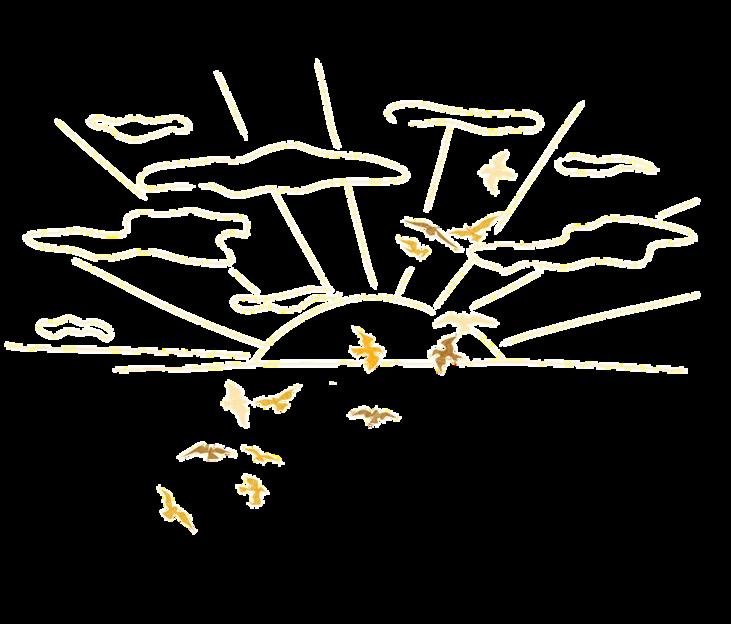
Above The Edge
By: Jassifat Kaur Khurana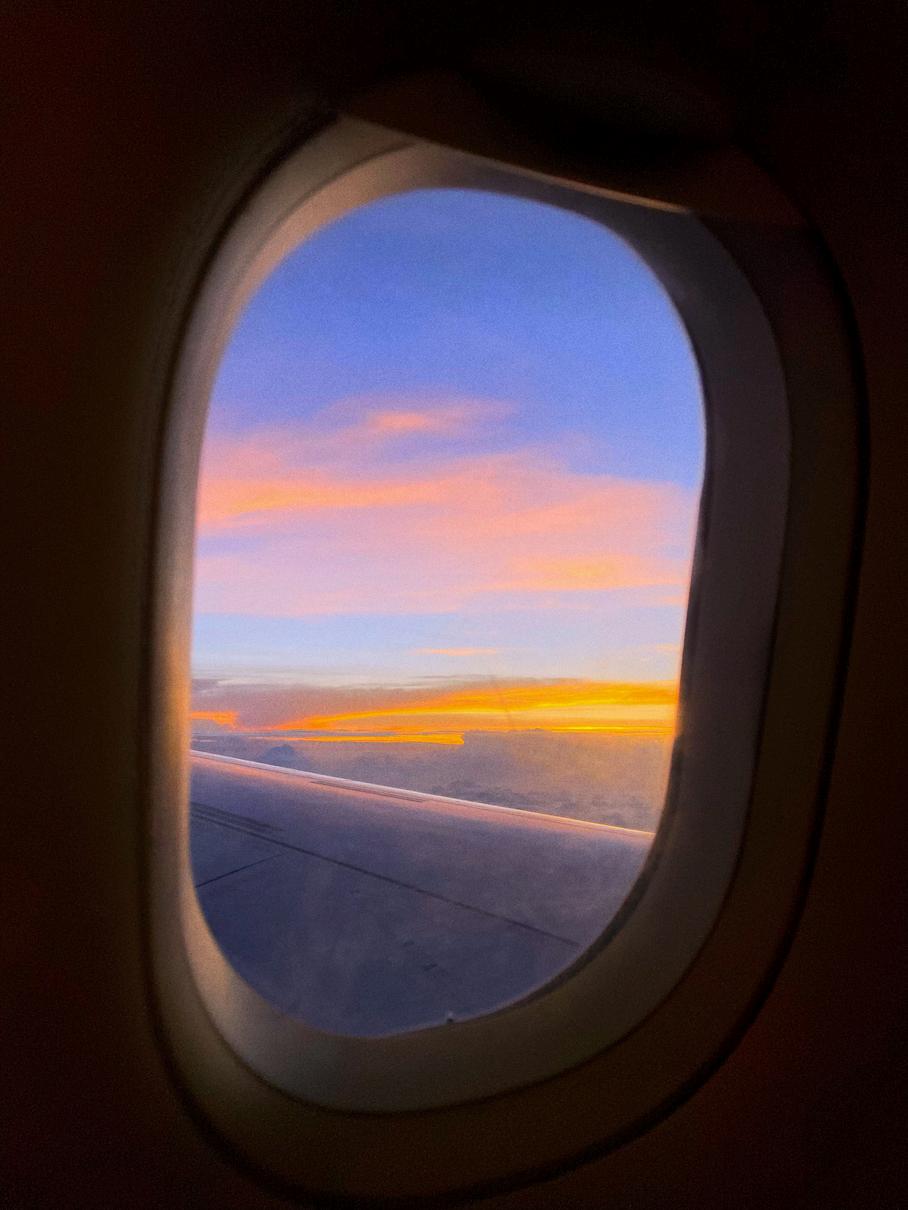
Where the Fox and the Hare say Goodnight
By: A.J.M Aldrian*Previously
published in ZiN Daily Literary Magazine*There are ghosts that run in the hallways of my mind
Keep me crazy, longing to be free
In backwards time
To the last place we said goodbye
Wo sich Fuch und Hase gute Nacht sagen
The Raining Tree
The sun would rain rainbows there if I make it so, and the trees are telling stories in whispers
The languid and lusty forest would forever call my name with raining music of romantic lullabies
And mossy mud were as dry as sand when I touched it
Rubbing it in my hands, sweet like lavender in my mouth.
The morning sun is too loud, late in the day
When bells rings louder than life, mom calls, Doodlebug, do you remember the day? when you kicked the can and all bad things went away.
Grown now, I still remember
The lucid cinnamon scent wafting through the open windows on a rainy morning
But now ain’t you one well to know, then go fuck shit up-
Mama’s yelling now, and I’m yelling at myself
Let’s escape from city, traveling up North again
To where those ghosts don’t run, don’t scream
Instead hum in the woods of song free
Where the Fox and the Hare say Goodnight: "This piece reflects my experience at my cabin in Wisconsin, built by my grandfather and dubbed "Raining Tree" named for the tall white pines there that capture the rain, causing it to pour down all day He is a firstgeneration American, who emigrated from Austria, hence the German phrase used in the poem "Wo sich Fuchs und Hase guten Nacht sagen," where the fox and the hare say goodnight, refers to a place out in the boonies, which my cabin very much is. The poem also tells of memories that occurred there and the sights and smells that exist there. I hope it transports the reader to my cabin at the Wisconsin lakeside and tells of the history there."
After the half marathon
By: Amy DevineI have become a thing built of straw and entirely on fire from head to toe I am both burned and burning I eat and am eaten as someone hands me a piece of tin with a date on it I am empty and full, like a cathedral. The upper rafters of my body are nested by song only, by a harmony that builds its home from the finding of resolution. I am a relief in stained glass, fragmented and whole and poured into frames of myself like watercolour. I am one thing and another entirely.
Many years before now I woke up with an ants nest in my ribcage, the kind you skirted on long walks home A doctor took one look at my fresh spring face and pronounced me merely an explored vessel He said that when it is gone you will run with deer legs He did not consider the option to fumble me open, to see the flags planted in my arteries.
I had not yet seen the tulip fields of Keukenhof. I had not yet been kissed under my family tree nor held a root in the palm of my hand and cried for the things that had been unearthed. I had not yet lost a child and I had not yet found the mother in my bones.
A year before the race I had birthed a daughter and here she is now, suddenly asleep in her father’s arms I do not have deer legs and she could not wait for me to finish the race
After the half marathon: After many years of my body being battered both by chronic illness and by self-destructive behaviour, I find that the poems I write are ones of someone who is tired finally being forced to rest. Things are not perfect but they are peaceful and that is a kind of horizon.
after you
By: Katie StirlingI have been splitting twigs for a fire because their snaps and splinters crack the bones in my back this ache, ever so brittle and human On bitter days I haunt the creek, drawing trails through bristles of branches and clumps of snow crunched underneath my feet I stare into streams of freshwater slicing through the rocks and this is my image of you, over and over again, fragmenting I am unblinking even when the cold burns; I look the wind in its face and I thank it I try to thank you too I become the fog draped over the evergreens, my quiet thick and shapeless I am becoming the December sky, expressionless Not furious anymore Not angry at my own form Stood counting my pulse in my steely thumbs, each beat a reminder that I am still alive, after you
And when March floods in, like morning light after a strange dream, I will come back to show you. This wintered heart in my hands, thawing out and sticking to my palms like a caterpillar in a freshly woven cocoon. You once taught me that rambutans only ripen in the late spring. All my heart was in that fruit, all fat and flesh wrapped in a spiny shell none of it was ever to your taste. You left me split open and rotting in the dirt. You said spring needed more days. You couldn’t be more mistaken.
the silence of plumeria trees
By: Chisom EzeI.
Aba, the city of many lynchings, was the last place you would go. You, khimar-wearing, kohl-lined, oil-black woman
Anyone could see the north coiled in your face, like henna seeping between a bride’s fingers
Each time the city is mentioned, Mama’s trauma reemerges
She sings songs of broken bodies and fire-flayed skin, corpses at the roadside, in gutters, left to rot, like unwanted teeth
Redeploy, she begs you when the posting comes, and you try. You try, but the city is as she says: teeth decomposing, sinking into the soft of your thigh, holding you in place, refusing you release. Stay, it whispers, slithering. Stay.
II.
No one falls for a place like this, you think
No one ever chooses this: paint-bleached walls, filthy streets, beggars with their hands out, the stink of necrosis
III
It starts to grow on you, this here city
Now, in your chest, there is a softness when you speak of Aba
It is easier to believe in new beginnings, when you have watched an place shed skin, remake itself, break its own spine to correct its scoliosis.
IV
There are fewer fires now, you tell Mama when you call home You make a ritual of calling each Friday and after five months, surprise continues to hold her throat hostage when you speak, as if she believed the city should have swallowed you whole, spit you out in femurs and fibulas, spit you out in small parts.
V.
After dark, you walk down a street drowned in the shadow of plumeria trees Alone, but no longer afraid
glimpses of knowns and unknowns known
machinery of the body / underyoume
By: Arushi (Aera) Regeunderyoume / undermeyou / under both of us the pain / we willed away / morning afters / new horizons / my heart’s a mausoleum / ghost town’s lament sounding / body raised the white flag / last night i pretended / icyhot meant life meant death / meant absence of pain not / binding of pain to skin / hips that can no longer / carry the weight of themselves / the machinery of my body rusted / god rejoiced once again / i pretend that blackbird calls each morning / misty skies / mean morning after the storm / pain’s gone, darling / you can get out of bed now / a god i don’t believe in / forsaken me / underyoume / i pretend i didn’t catch myself / handfuls of acetaminophen shoveled in my mouth / become atlas holding up the sky / become sisyphus pushing the boulder / uphill forever / body’s raised the white flag / surrender the machine / drag the meatskinbody sack around / run a mile for a change / walk up a flight of stairs / icyhot means life means death / means another try / means horizon’s on the way / ghost town’s lament ceased / body’s still rusted but / cactus waving GOODBYE DEAR BODY / like the meat of my body’s / not going to survive atlas / holding up the sky / spit out the ghost / haunting your body / remember the pain’s / gone today gone tomorrow gone until / icyhot wears off / i pretend i’m not afflicted / with the pain / twin ligament tears in my hips / so walk a mile / so run until i can’t feel / my lungs or my legs / whichever comes first / so kiss the boy who / called my phone to / make sure i could get out of bed / in the morning / so the machinery of my body’s rusted / so a god i don’t believe in / has forsaken me again / so it’s a new horizon / so i let the body haunt me / so i will away the pain with icyhot / so the ghost town’s lament is over / so i’m atlas / holding up the sky / so i’m not in pain today / so i’m finally alive / so i’m free / so god may have forsaken me / so i’m rejoicing / so the icyhot doesn’t hold over me / so the horizon’s near / light at the end of the tunnel / machinery rusting changed out for an alloy / nights spent awake / trying to drag my body / out the rust / drowning hips legs knees in icyhot / wake up the next day / fan’s spinning in perpetual motion / blackbirds still embrace morningsong / amma still makes chai in the kitchen / 80s bollywood still plays / morning after brings / new horizons / new experiences / same day / over & over & over & over / amma still makes chai / the kitchen’s lively / i walk in / i smell like i’ve been drinking / alcohol & menthol slathered across my hips / amma smiles / sings along to 80s bollywood / lata mangeshkar sings airanichya deva tula & my dad / makes a horrible parody / so i wake up / so i walk to the kitchen / for the first time in a week / i’m walking / so the kitchen’s lively / amma makes me chai / and tells me she loves me / new horizons / ghost town’s lament is over / the machinery of my body’s new / and so / life goes on
machinery of the body / underyoume: I wrote this piece after a really bad week of pain I had, where I couldn’t get out of bed at all, due to immense pain within my hips. It was miserable the entire time I was there, because I was basically stuck in the same position; I felt like a zombie the entire time. When I finally got out of the feeling of being constantly in pain, I walked to the kitchen, where my parents had continued life as normal. I remember it being excruciatingly hot outside, something like one hundred and ten degrees fahrenheit, and I remember that it was sunny We have cacti in our backyard, and it almost felt like their seventy-year-old hands were waving hello at me It was easy for me, I think, to be awake and walking because my mother had made masala chai in the way I loved, and had made all my favorite foods to eat I knew that at that moment at least, I’d be okay The piece itself is deeply meaningful to me, as it’s one of the earliest and hardest pieces I’ve written about my chronic pain It truly was difficult for me to continue this piece and finish it in a way that made sense, so I’m really proud of this piece I hope y ’all enjoy it too
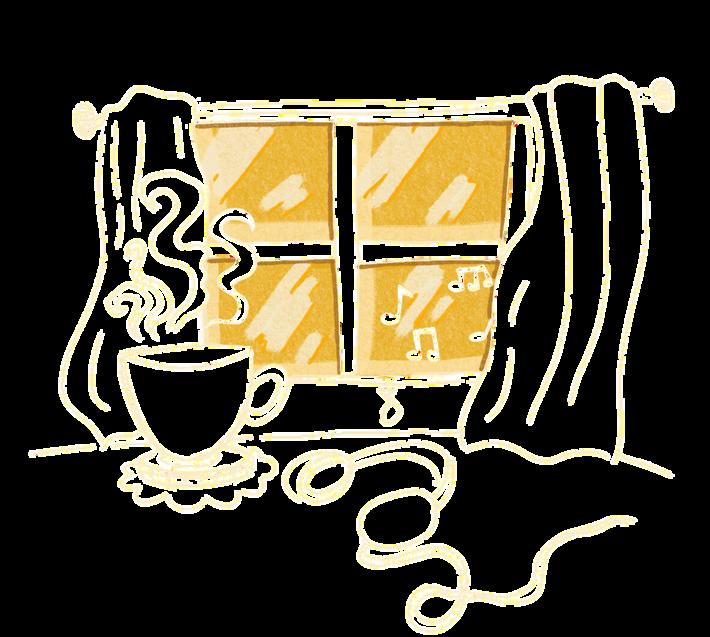
I’m worried that I’m not following / the instructions
By: Cailey Tin*Previously published in Iris Youth Magazine*
*this poem is contrapuntal, meaning it can be read either left to right or down the first column, and then the second
I’m worried that I’m not following /
mother around enough I left her panic-stricken, eyeing the instructions: they’re unreasonable for me because I can’t see through Doc’s rulebook: how to arc my knees I can’t with hospital stairwells; they’re like my ladder spine wings in, chest spiraled out Trunk deviating A metal rod holds up my steel-filled form. My feverish rope/ladder body that always needs company, my wasted imagination goes, look there. Ghosts. bone-thinned arm clutching mother in wide-eyed quietude
They comfort mother. What matters: Her love languages are cleaning and cleaning me and her relief on my withering frame for the patient room ’ s sheets, white and unsoiled, was made my security: she knows how I’d look with her love / poured out like healing / drop by drop
like as a free, uncaged spirit / less reprimanded by therapy rods Body naturally behaving by the book with the title of recovery
that which only we know
ARRIVED, SETTLED, DEPARTED, (LEAVES)
By: Qetsiah Joachim-BaggottWhen my anorexia arrived, it was dressed as Holy water Lent, tripping around the corner, fumbling with itself in the last moments of indulgence God allowed, told me that Jesus didn’t eat. Forty days he went without, no morsel touching that sanctified mouth. Lent told me fasting was a gift to God, a purification for the unwashed. I was not unwashed, but I had always felt a little dirty. Maybe it was the OCD no one had seen, (It hid in the same corner as the autism and the traumatic screaming which always seemed to outshine it. even when it wore a spotlight on its paranoid forehead? even when I shone the spotlight on it) maybe it was the two kilos I’d gained since Christmas maybe it was the way I’d smiled all dizzy at the pretty girl in my class There are so many maybes’ waiting in the wings of my mind and there were too back then, that Lent, the seventh one I’d ever known, the first one that would ever matter to the outcome of my immortal soul and I took every word seriously, I still take everything seriously people tell me to let go but I can’t, I’m still seven, in the pews of a shadowy church being told the story of Jesus and his saintly starvation Being told that I can do it too So, the Godfearing girl I had been told to be, I shut my mouth. Lent flickered by and I ate very little and after a while the pang of hunger was my addiction; I would leave more than half my plate in the bin or the toilet – my versions of an altar, it’s all I had to work with then – as an offering to the original pro-ana blogger Jesus Christ himself to thank him for enlightening me, for showing me that food was danger, food was sin.
When my anorexia settled, it no longer needed its cloak I was deep enough inside it to know the weight and colour of 95 calories and that the sickening scent of eating clung to your teeth just like treacle it stained them brown and ugly and wouldn’t it be nicer for everyone if you just didn’t eat I ran my tongue over and over and over my smooth teeth that stayed smooth I ran my fingers over and over and over my xylophone ribs that made music I ran my hate over and over and over my broken heart that stayed broken I curled my toes to make sure there wasn’t fat at the sides that I’d have to cut off with a knife or blunt scissors or my short
nails which were short for a twofold reason that music is hard to make and it cuts your throat when you evict your own stomach If I ever found any extra fat I’d cry like a baby like a mother like a baying hound and set to getting rid of it, decide to start shedding more layers like an aged snake, slimming down to just my spine I started only consuming at Holy communion when I knew the food was pre-approved by my celestial diet guide, I started only thinking about food, I must have seemed so ditzy, imagining the bitter sting of salt water as a sin but still desire it so hotly I started only dreaming about food, the way it might feel to let the one thing I desired most slip back down my throat like a salve.
When my anorexia departed, it was dressed as Holy water. (Bile in my mother’s toilet bowl my father’s sink my sister’s bucket my school’s sickbags people were always wondering why I was so ill all of the time and why my sickness looked so clean) The church approved method of getting rid of a demon is to starve it out, I found that in the back of Deuteronomy - the Jesus-designed weight-watching brochure Is it then any wonder that people die from anorexia? God forgot to design hunger into demons, it seems I have lived with many; the only one I ever came close to evicting was myself Anorexia herself is an angel, large expansive wings fill your stomach, so you forget to eat Or I did Forget is wrong, don’t remember is better It is a choice not a mistake, anorexia chooses for you, she slides the beads along her abacus and tells you how much you can eat today can drink today can breathe today can move today can live today I grew up dreading the day when the beads would tell me that I could eat but that I could not live. I grew up dreading the click of her tongue against her teeth as she called me sweetie and asked me what went wrong at our daily weigh-ins I grew up dreading the day she would pull out her calculations and inform me that, despite my best efforts, despite my feathered bones despite my stubborn purge, despite myself and her, I had turned into a white whale, that soon someone would call me Moby, and pierce me with a harpoon She never really departs in life; I found out after she told me that she’d left She sits in a bend in my mind like Janus at the crossroads she is two skulled recessed into the darkness whispering something sinister about Lent and angry Gods and closed fists and swollen bellies
When my anorexia leaves, I will be in heaven with her I will stand next to her, bat wings flapping, wrinkles pressed into my leather skin, and I will ask her how much she’s had to eat recently. She looks a little thin no not thin she looks a little sad. I once cried when someone told me I looked sad maybe she’ll cry too wonder why she’s done all this when her eyes were beautiful when her smile was perfect when her mind was enough to keep anyone inside of the conversation for long enough to decide they loved her when her soul was a shining white already and a really benevolent God wouldn’t want a young girl to become a skeleton to prove it he wouldn’t have made it a requirement he wouldn’t have made his son do it he wouldn’t have sucked in his breath when I had one more grape than I should have done because he would have wanted me to eat the fucking grape To fucking eat To feast A benevolent God would have let me feast on him, and not just nibble on his son ’ s flesh and blood on sundays I’ll tell her all that I’ll tell her it’s okay, I’ll say that maybe she should go out to dinner with her friends enjoy a quiet night in with a takeaway on her knees discussing TV with her sister maybe she should buy a Mr Whippy and really savour the boring vanilla flavour because there’s no Maybe, she should her own space an to feast on the wo of an ocean the w meal the wonder she’ll tell me she’d Maybe I’ll be able
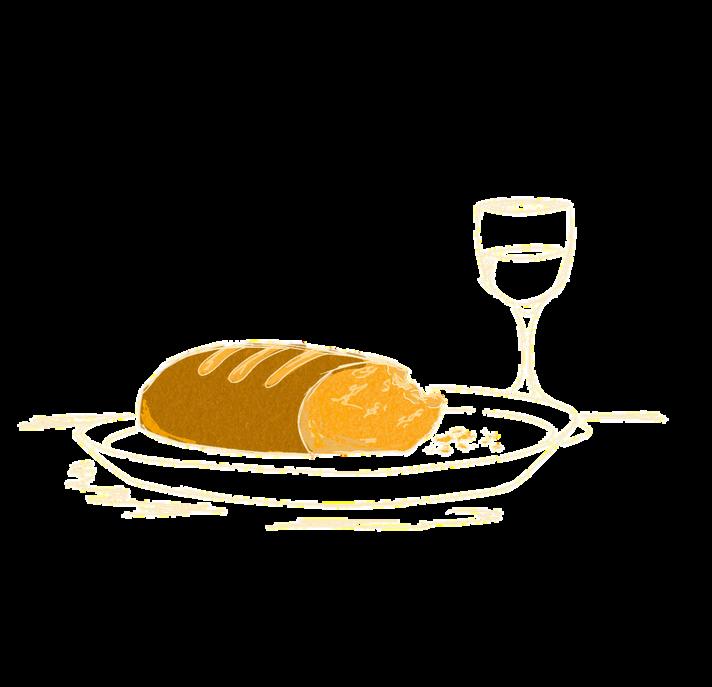
For These Brief Moments
By: Tim Murphy*Previously published in Wordgathering*
I measure time by the angle dim slivers of light enter my room each morning from behind ever-closed curtains, by the way their faint glow subtly shifts through the day, until it fades beyond the reach of dusk
Nine months bedbound, I lose track of the natural world, the only place I didn’t question if I belonged. But strains of it still drift through walls in birdsong, distant banter of crows, whispered echoes of rain.
Spring’s finches grow chummy in summer Each day, around noon settling on the windowsill just above my bed They bathe in the warmth of the sun for much of the afternoon
I can’t see them but hear the soft scraping of claws scampering about, the occasional fluttering of wings, bickerings over who sits where. And for these brief moments I am not lonely.
For These Brief Moments: This poem reflects on the loss of the more-than-human world while bedbound with Long COVID. Nature was my sanctuary, and it is one of the heaviest losses I've experienced during this time. But these finches that joined me each day reminded me that we're always part of the living earth, even if our relationship to it is more distant than we long for.
I Walked 3,000 Miles To Susan Sontag’s Kingdom of the Ill and It Was Just The Back Of The Uber Where You Told Me You Had Cancer
By: Ari WatkinsI walked all the way to the Kingdom of the Ill, just to find the back of the uber we were in, driving over the Brooklyn Bridge at night, when you told me you had cancer, and the stars were lanterns in the sky but I didn’t notice, because I was looking at your hands, your face pressed against the glass.
I walked all the way to the Kingdom of the Ill and it was just my physical therapist’s office, it was just the yellowing elevator pass in the back of my phone case.
I walked all the way to the Kingdom of the Ill, and it was just the coffee shop on Montague where we sit together once a week to hold the pain in both hands and watch it melt. I walked all the way to the Kingdom of the Ill and it was the pharmacy aisle of a Sunflower Market where a pretty girl with a stickered-up cane took the time out of her day to give me detailed explanations about magnesium glycinate dosages of different brands who saw my basket full of pill bottles and didn’t flinch, didn’t smile extra-pityingly, just asked “how can I help you?” and meant it I walked all the way to the Kingdom of the Ill and it wasn’t a hospital waiting room, wasn’t the shitty sickbeds at the nurse ’ s office, wasn’t a medical professional with a clipboard telling you just take a painkiller, just lose weight, just bear it, just/just/just. I walked to the Kingdom of the Ill and it was full of beautiful sick people laughing. I walked all the way to the Kingdom of the Ill and I had to keep stopping to sit down and rest every few minutes, so, sorry I’m late. But I’m here. I’m here now, I’m here.
Door
By: Katie StirlingHow battered you look, crumbled at the door of January again Your powdered eyelids molten in the heat of fireworks Those retinas embossed with the chemical stains of some burgundy sky, bleeding at sunset, warnings to come home You, shifting your weight between muddied shoes, smearing the welcome mat One hand buried in your pocket, thumbing the ridges of shell casings, the other bandaging the bullet wound on your own cheek These are relics of hurting These are relics of hurt oscillating This whiplash is metallic
How you untie your laces at January’s door, to pad your calloused and cracked feet on her wooden floorboards again. How you want to take your skin off, to soak bare in her bath salts. How you want her to scrape the scabs off your back like stripping paint off a wall, scrub the dirt from your chipped fingernails. How you long for a saged room, to stick incense sticks in sand. How you want to disassemble your body, on linen sheets lay out your vices and virtues, reconfigure and stack yourself up again. You come home to January every year, saying you want fortune to forget your luck. How you want to dip your hands in whiteout, to write resolutions in her journal. You should know she will trace your each new corner and curve and crevice with the same wonder. Enveloping you in her arms no matter your shape
They told me the borderline is incapable of love / butBy: Zoe Davis
I picked the boy with borderline I chose him It was a fault in me, according to friends, who screwed up that word and threw it harder than any mania ever rocked us But I stood when he sank, held his head above water, because love is buoyant, love is a half-chewed pool float the child in me still grips onto.
“I ran you a bath I knew you’d be tired,” he said, when I crumbled in from work, and how those words embraced me
He let me sink
The strength that took The strength he gave
That was love
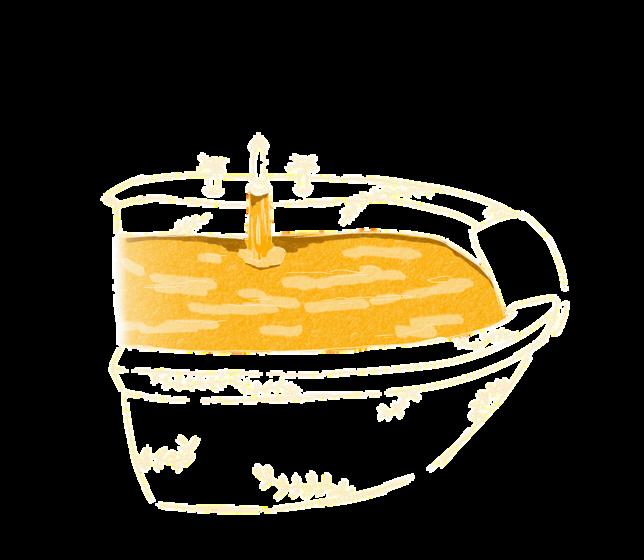
They told me the borderline is incapable of love / but: Negative portrayals of people with mental illness are all too prevalent in the media. Social stigma also remains, failing to look deeper than a diagnosis, or rather, a label. There are books to help you understand the condition as a carer, but they are all called things like ‘I hate you, don’t leave me ’ and paint a very bleak outlook if you are a partner or family member My husband, who was diagnosed with BPD many years ago now, is a constant source of inspiration to me- I understand he will always look at the world and react to certain things in a different way to many people, but he tries every day to be the best version of himself, and that’s enough That’s honestly, enough
A Saturday, Like Every Other Apocalypse
By: Jessica SwansonIf you have made it this far, with cunning, with grace (with broken nails, mysterious bruises), don’t focus too much on the night-haze
Be the mockingbird, the cardinal singing at the first scrap of dawn, “I have made it, my love, through the dark As have you ”
Be the crow dancing after the flash of broken windchimes
Be the rooster crowing at odd hours, holy denier.
Take your sunlight where you can find it.
Remember, as the world pushes past the need for the delicacies of human speech, of decency, drops on all fours to a cadence of grunts and moans, cats were smart enough to domesticate themselves.
You can be feral, too Someone loves you all the same
And when it’s time to cut back your exotic florals and burn them for warmth, just think:
We all grow back
A Saturday, Like Every Other Apocalypse: This poem was originally written in response to a prompt to write a letter to yourself after surviving an imagined apocalypse. I opted for more universal language instead. Sometimes, just making it through the day--like a Saturday--is enough of an act of survival.
Grateful Scents
By: Angela TownsendThanksgiving smells like studly cologne and alcohol wipes
When you are nine years old, you do not know the difference between marjoram and Eternity You know that, on the fourth Thursday in November, you get to wear a jaunty hat, velveteen with flowers Your grandmother greets you wearing a rhinestone turkey, erupting in My Fair Lady songs in the driveway Your father’s pants are noisy red corduroy, which your mother finds embarrassing, which you find hilarious
Your uncle and his house gently descend from the cosmos once a year They find their way to earth by sense of smell. Thanks to your uncle and his house, all of Oakland, New Jersey has a scent so thick it can be seen. It is wonderful because it wafts around Your Timmy, bespectacled and long-suffering.
Your cousin will play The Fish Game with you, an eight-bit extravaganza in which you are a carp attempting to remain uneaten. Timmy will let you play with all his plastic baseball hats from Friendly’s. Timmy will joust with tiny swords from Chinese dinners he must have eaten in his other cosmos. You have been attempting since infancy to set a drop-trap that will keep Timmy in your cosmos for longer than one day a year
Your mother and grandmother will threaten the balance of the universe by crowding so much beauty into a single room, and you will smash yourself between them on the couch like nougat Your grandfather does not want to be here at all, but when he sees you, he shouts “Princess!” Soon you will be drawing pictures of his bald head like the sun emitting rays
You would if it were an ordinary Thanksgiving But when you are nine years old, everything smells terrible, and all you want to do is sleep Your mother is no less beautiful for being pale today, but she will not stop kissing the crow ed you pull on your tights, her arms yanked you airb t know why. She promised you would see Your Timm
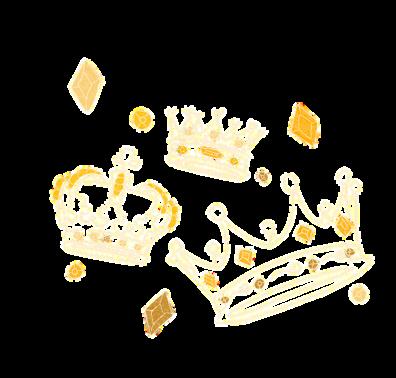
Tomorrow, you and your mother and your father will touch down in a new land, where you must anoint your fingertips with alcohol before five blood offerings a day. You understand. You read about this once in a book about babysitters. You will inject insulin and live. You will sweep the house of Hi-C and pecan sandies like a raid. Your knavish doctor will force you to inject your grandfather with water to prove it doesn’t hurt. Your uncle will receive permission to leave his cosmos to visit you in the hospital He does not bring Your Timmy, but he does smell like Thanksgiving
Your father will make hot-glue sculptures of bunnies with orange syringe caps for ears
Your mother will experiment with sweeteners that cannot hurt you Your grandmother will bring a fifty-five-gallon drum of sugar-free red Jell-O –you agree that there is a single red flavor superseding claims of “cherry” or “strawberry” – to your tenth Thanksgiving
When you are ten years old, you have been diabetic briefly enough to still do your duty of dabbing your fingers. Your mother murmurs something about not leaving cotton balls in your aunt’s seashell bathroom. You quarantine the bloody bunny tails in your Care Bears purse, small refugees from the wrong holiday. Thanksgiving smells correct again this year. You will not sleep through your chance to survive a day as a carp with Your Timmy. You do not mind that Your Timmy and his sister, the mysterious and stately Stacey, are spraying Reddi-Wip into each other’s mouths. You do not miss dessert, because your mother is kissing the crown your head, and your grandmother has brought you five rhinestone pins – no, not to choose between; they are all for you
Your aunt surprises you with a blue box of chocolates which “ may be safe for diabetic use on the advice of a physician ” Your mother and father convene and agree that this is fine You have not thought much about chocolate, so you are surprised when you eat them all You do not know much about “ a potential laxative effect,” so you are surprised when you have a complicated evening.
But it is Thanksgiving, and when your uncle hugs you, it smells as though time and space are shaking hands and agreeing you will be fine. Your grandfather is happy to be here and draws a cartoon of you while your parents drink coffee. You pull your velvet hat over your forehead, and Your Timmy says you look like Dick Tracy. You decide you want to be Dick Tracy for your eleventh Halloween You fall asleep covered in rhinestones
lost and found, again, again (with beauty)
i found it againBy: Charlotte Poe
In December you disappeared; turn of the year calls for turning inward and the joyous warmth that only a housefire can bring finally whimpered out, ashes raining down and smogging the sky and everything in the room. Say to yourself, little ghost boy, what did you learn from facing the end of the world and digging it into the very core of you? It felt so big, stuffing it inside, but it fit so perfectly it might as well have been made for you. Like a fox slinking off to die, you remember too bright headlights and the sudden impact, and then nothing, for a very long time. The winter –
drags
like every frosted morning might never come, the sun shy and all washed out, more grey than yellowest yellow, and then the dark, again, a few hours to bask and raise your face to the heavens and breathe in, before it steals away again, settling over your very bones like moss and lichen and you, you, ghost boy, you lay down and feel the forest creep over you, deep and dark, and in the distance a fox calls, and you think –
oh it has not yet slunk off to die, it still calls, desperate to be answered, and maybe, in between the void spaces of sleeping, you yearn in the same way, my sweet ghost boy, and I’m sorry, I suppose, that nobody speaks the language of these coldest months in the way that you need, December a curse, December harsh and unforgiving, and when the year turns over, you sleep through it, waiting for the dawn –
new
like the most fragile, breakable thing And god, ghost boy, you want to smash it to pieces And they light the candles for you, kindling to get that housefire burning again And you speak in tongues until the words rev end and in all the places in between and u are here and –
maybe it will all be okay after all.
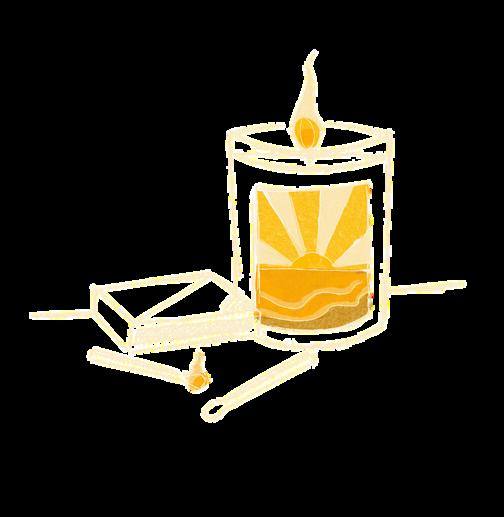
This is not a curse
By: Afra Adil AhmadOn the day my daughter turns three old enough to understand fragments of the intricate theory of love, I will unfold my prayer rug and proudly confess to her:
this is where you beg beg as if there’s no tomorrow beg without the hesitation of hoboes in front of the porticos of affluent businessmen beg like a gale that would sabotage the plans of his perpetrators beg with a belief that you will be awarded what tell as if you would perish without telling and then continue telling your Most Benevolent how your day went, how someone fibbed to you what makes you burn in delight, what are your d
cry as if you have something to cry for
this is how I will help her practise for I know the intense years that will unfurl she will have something or someone to cry for
this is not a curse, I swear this is prayer in its purest form for I know this world will break her too the way it broke me, the way it broke my ancestors, so I have to help her long before she begins believing she’s irreparable like pearls that know they can never go back to their celestial shells
but with God by your side even the moon can be halved
I will help her the same way my lovely mother did.
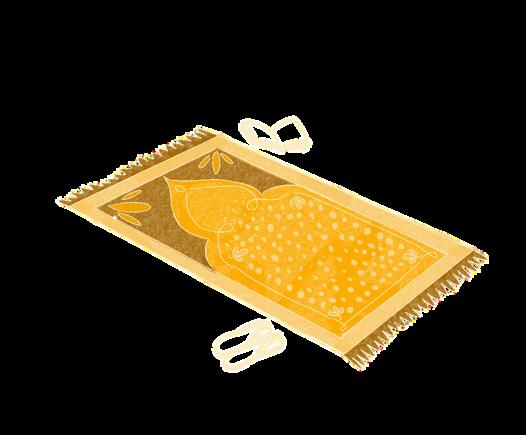
POETRY
This is not a curse: In “This is not a Curse”, Afra Ahmad writes about a confession she plans for her daughter; one full of desperate instructions
Contributors
Ari Watkins is a sixteen-year-old emerging author from Brooklyn, New York They are a graduate of the Reynold's Young Writers program at Denison University Their poem 'red-tailed hawks' won first place in the 2023 Ned Vizzini Teen Writing Contest and was published in the Brooklyn Public Library's Teen Writing Journal You can find them on Instagram at @ariwatkiins
Kate (she/her) is a fourteen-year-old writer from Singapore. She takes inspiration from classic poets like Frost and Wordsworth, as well as local names, and also loves reading John Green and Jeffrey Archer. Her interests include psychology, linguistics and motorsport. Her poetry focuses on exploring emotional and mental states, as well as physical locations and atmospheres You can find her work on instagram at @between ellipses
Afra Adil Ahmad is a writer, poet, artist and calligrapher Based in Taiwan, she holds a Bachelor's degree in English Literature She writes about everything under the sun: from dark issues of the society to problems faced by teenagers to imparting chunks of wisdom through her poems, stories and write-ups Her works have appeared in various magazines including Iman collective, MYM, Rather Quiet, Euonia Review, Olney Magazine, The Malu Zine, The Sophon Lit, Blue Minaret, Melbourne Culture Corner, Her Hearth Magazine, The Hot Pot Magazine, Broken Spine Collective
Amy Devine is an artist from a lineage of artists whose work has been featured in several publications including Orange Peel, Gems and Beyond the Veil Press She is based in Sydney, Australia and she is inspired by history and the narrative of humanity.
Angela Townsend is the Development Director at Tabby’s Place: a Cat Sanctuary. She graduated from Princeton Seminary and Vassar College. Her work appears or is forthcoming in Arts & Letters, Chautauqua, Paris Lit Up, The Penn Review, The Razor, Still Point Arts Quarterly, and The Westchester Review, among others. She is a Best Spiritual Literature nominee. Angie has lived with Type 1 diabetes for 33 years, laughs with her poet mother every morning, and loves life affectionately. She lives just outside Philadelphia with two shaggy seraphs disguised as cats.
Charlotte Amelia Poe (they/them) is an autistic nonbinary author from England. Their first book, How To Be Autistic, was published in 2019. Their debut novel, The Language Of Dead Flowers, was published in September 2022. Their second memoir, Conversations With Monsters, will be published in 2024 Their poetry has been published internationally Instagram: @smallreprieves Website: charlottepoe com
Contributors
Tim Murphy (he/him) is a disabled, bisexual attorney, environmentalist and poet residing in Portland, Oregon His writing explores the natural world, disability, and the climate crisis Tim’s poetry is featured in CERASUS Magazine, Writers Resist, Honeyguide Literary Magazine, The Insurgence, The Long COVID Reader, and more Instagram and Twitter (@brokenwingpoet)
Zoe Davis is an emerging writer from Sheffield, England A quality engineer in advanced manufacturing by day, she spends her evenings and weekends writing poetry and prose, and especially enjoys exploring the interaction between the fantastical and the mundane, with a deeply personal edge to her work. You can find her words both published and forthcoming in publications such as: Acropolis Journal, Strix, Illumen Magazine, Full House Literary and Broken Antler. You can also follow her on X @MeanerHarker where she's always happy to have a virtual coffee and a chat.
Arushi (Aera) Rege is a queer, Indian-American poet who simultaneously attends junior year in high school. In their free time, they can be found reading good books, listening to R&B, and stressing over college. They tweet occasionally @academic core and face the perils of instagram @aeranem 26. Their works have been published in Stone of Madness Press, Full House Literary Magazine, fifth wheel press, and more. You can find their website at arushiaerarege.carrd.co.
Jessica Swanson (she/her) is a librarian and a writer. She lives somewhere along Florida’s Nature Coast with her dog, Lily. She has a fondness for cats, cheese, and hot tea. Her work has appeared in or is forthcoming from Moth Eaten Mag, Dog Teeth Lit, Metachrosis Literary and others
Follow her on X/Twitter at Cooljazsheepie or Instagram at everystupidstar
A.J.M. Aldrian is a graduate of Hamline University with a BFA in Creative Writing, and a minor in History She loves many genres including fiction; horror, sci-fi, literary, and fantasy, as well as poetry and non-fiction, historical, and nature and memoir She collects books and loves spending time cuddled up reading them with her partner and cat She can also be found on her podcast “Thinking on the Air” on Spotify
Cailey Tin, hailing from the Philippines, is a columnist, poetry editor, and/or podcast host for publications such as Incandescent Review, Paper Crane Journal, and Spiritus Mundi She can be found (imagining) chipping away at pieces, whether it's in journalism, piano, or debate speeches
Notably, at 13, she received a Pushcart nomination and earned recognition from Ice Lolly Review, Fairfield Scribes, and more Her work has appeared in Eunoia Review, Iris Youth Magazine, Sage Cigarettes, and more Follow her teenage endeavors//shenanigans on Instagram @itscaileynotkylie
Contributors
Jassifat is a university student majoring in Psychology Her journey stems from her ability to connect with others on an emotional level She aspires to build a career where she can help people better understand themselves and those around them She actively immerses herself in internships, to keep herself constantly challenged and evolving Beyond academics, Jassifat enjoys photography and occasionally writing, two hobbies that unveiled themselves during the lockdown and has since become an indispensable part of her life
Chisom Eze is a writer and artist living in Port Harcourt. He is a student at the university of port harcourt, and when he cannot be found writing, he will making sketches, reading fiction, or nodding to bizarrely loud music.
Qetsiah Joachim-Baggott is a young queer poet and writer from the south of England. They were shortlisted for the 2022 Merky Books New Writers prize, and made the longlist of the BBC young writers award. Their poetry is in, or forthcoming in The Machine. In their spare time, they cuddle up with their cat in front of Pride and Prejudice 2005.
Thank you for joining us.
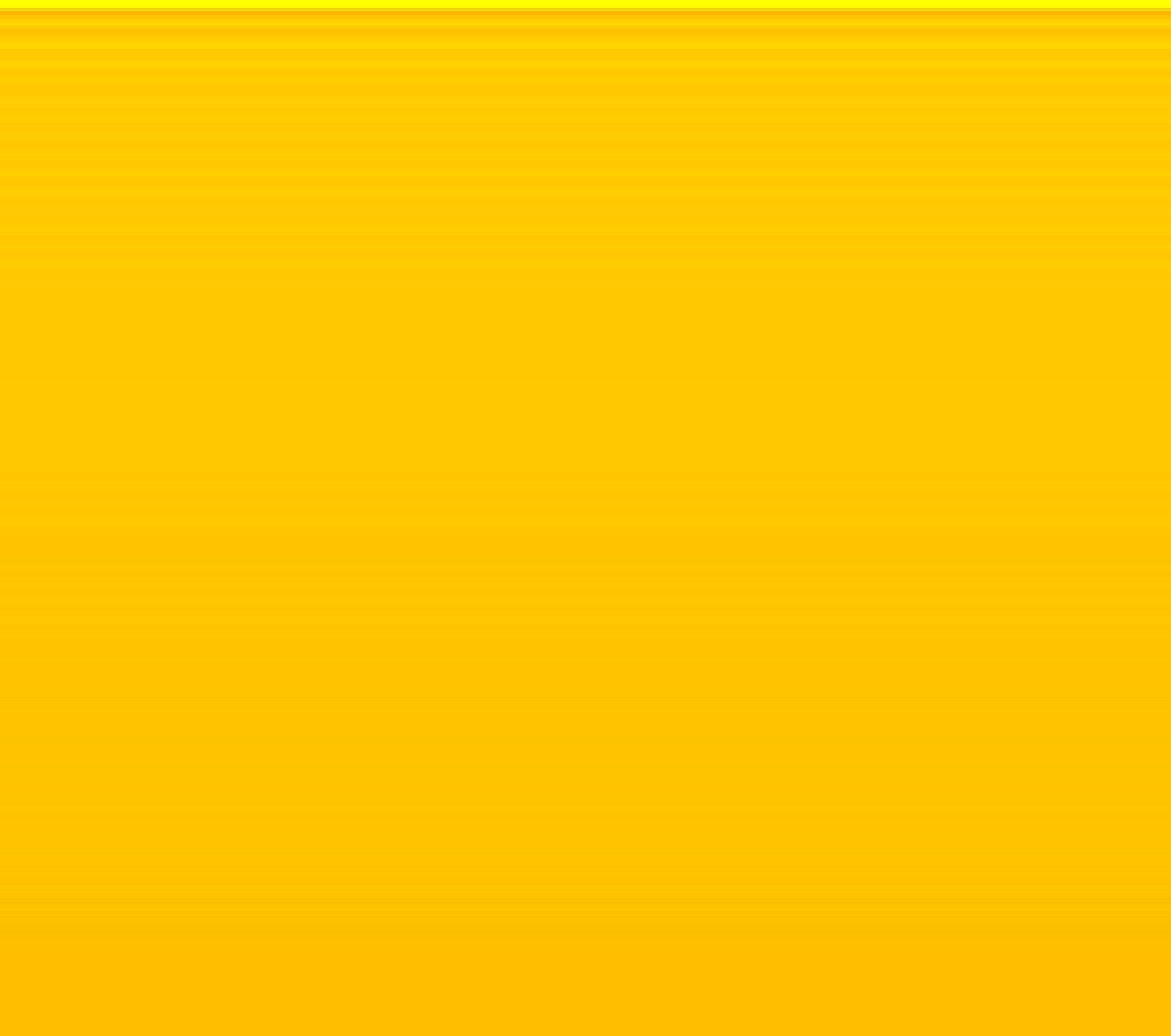 Editor in Chief: Stuti Desai
Editor in Chief: Stuti Desai
Publication Director: Janelle Yapp
Layout + Graphics: Isabela Santana
Spot Art: Honey Radadiya
Cover Art: Honey Radadiya
